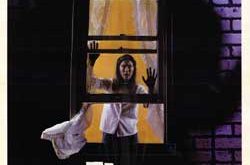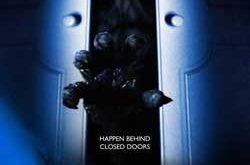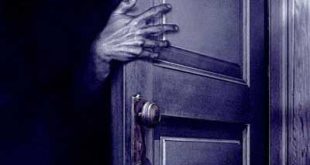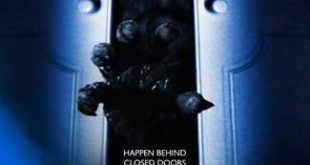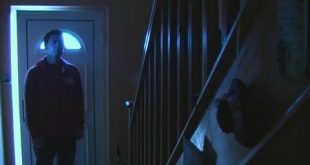![914335_300[1]](https://horrornews.net/wp-content/uploads/2011/04/914335_3001.jpg) Hey there acolytes of mine! The Black Saint has a special treat for all of you on this fine day. Gerard Lough is a filmmaker that comes to us all the way from Ireland with a highly acclaimed short called “The Boogeyman” which is based on the short story of the same name by Stephen King. He is also hard at work with his first full feature film to be called “Deviant”. I was lucky enough to be able to chat with him for a bit & find out what makes him tick. He is most definitely a talent to keep our eyes on & I consider myself lucky to be able to talk to him now before he becomes the major filmmaker I believe he will become. Read & enjoy!!
Hey there acolytes of mine! The Black Saint has a special treat for all of you on this fine day. Gerard Lough is a filmmaker that comes to us all the way from Ireland with a highly acclaimed short called “The Boogeyman” which is based on the short story of the same name by Stephen King. He is also hard at work with his first full feature film to be called “Deviant”. I was lucky enough to be able to chat with him for a bit & find out what makes him tick. He is most definitely a talent to keep our eyes on & I consider myself lucky to be able to talk to him now before he becomes the major filmmaker I believe he will become. Read & enjoy!!
The Black Saint: I think it would be interesting for all of us to know what got you interested in filmmaking initially?
Gerard Lough: After leaving college, I was having trouble getting started as I encountered a “Rude Awakening” in regards to no longer being able to get access to free equipment and learning the hard way that a good diploma is no substitute for a list of film credits on your C.V. My luck changed when I got a seven week internship with a great advertising agency in America. During this period I ended up directing my first professional music video & short film. Feeling more confident after this positive experience, I bought my own equipment when I came home to Ireland and got to work making several self financed short films as well as more music videos.
TBS: Who, if anyone, influenced you in regards to your directorial style? And why?
GL: Like a lot of directors, I would have to tip my hat to Ridley Scott’s “Blade Runner” which is endlessly fascinating to me not only for it’s stunning visuals but for the provocative ideas it explores. In my films I like to use lots of smoke & back light things so that’s where that comes from. If you have a good eye or passion for photography then it’s films like this that you need to be studying. If I were to pick an individual filmmaker who has been the biggest influence on me, I would have to say James Cameron. I also have a “Hands On” approach while making a film and I agree wholeheartedly with his philosophy that “If you’re not bringing a passion & intensity to it, you shouldn’t be there”.
TBS: Did you study formally or is this something you started on your own?
GL: I received a 2 year diploma in media studies in the late 90’s & although that’s where I learned to edit, operate a camera & learn the difference between depth of field and an aspect ratio, I would have mixed feelings about advising anyone to go that route today. The fact is that a lot of film/media courses are taught by people who never actually went through the experience of making a film…of any kind! It’s the same as getting driving lessons from someone who’s never been behind the wheel of a car, but they read the manual. So for anyone who’s reading this and thinking of becoming a film director, I say save the money you’ve put aside for college tuition & instead go buy yourself a good camera and editing software and get to work. If you still want the theory then get yourself a library card!
TBS: How did you get Stephen King to give you the rights to film “The Boogeyman”? Did you meet him directly or was it through correspondence?
GL: I knew of his fear of clowns so I stalked him for six months dressed as a clown until he gave up the rights! No seriously, since the early 80’s he has been generous enough to allow up & coming filmmakers to adapt one of his short stories as long as they agree not to commercially exploit them. For example, they can only be screened at film festivals. You pay a fee of one dollar to get the rights to adapt a story, which is why these short films are often referred to by King fans as “Dollar Babies”. One of the highest profile “Dollar Babies” was “The Woman In The Room” directed by a then little known filmmaker by the name of Frank Darabont. I haven’t met King yet. If I do, I hope the first words out of his mouth aren’t “Well you really screwed up that adaptation pal”!
TBS: Why did you choose “The Boogeyman” out of all King’s short stories to adapt?
GL: Amateur psychologists will have a field day with this answer but I’ll try to explain. Despite being first published in 1978, I think the stories themes and ideas are as relevant now as they were then. On the surface, It’s about a troubled man who goes to see a psychologist because he has this crazy theory that an evil creature has killed his children. But what it’s really about, as far as I’m concerned, is parental neglect & the guilt that comes with it. It’s this guilt that is the real boogeyman of the story in my mind and Billings, the lead character, can’t outrun it no matter how hard he tries. Suffice it to say that the story just clicked with me on an emotional level when I first read it. Read into that what you will. From a film-making point of view, I saw the potential for it to be a film where the line between reality and fantasy gets more & more blurred as it reaches it’s ambiguous conclusion. When you think about it, Billings is an unreliable narrator because you get the sense he’s not being entirely honest when he tells his story to Dr. Harper. The big question is whether this Boogeyman really exists or is it Billings’ delusions brought on by stress, or is it his way of rationalizing something he did that he is now in turmoil about? I made my mind up before I shot one frame of film but each individual audience member has to decide for themselves when the credits roll.
TBS: Although there are only a few actors in “The Boogeyman”, they all perform admirably. Was there any rehearsal time involved while readying the film? Table readings perhaps?
GL: I’m not a big fan of table readings or rehearsals. Their only real practical use is to give the script a polish in the sense that it may seem fine on paper but not sound quite right when read by an actor. I suspect the other reason for them is as an exercise for all the actors to get used to working with each other & break the ice. My two lead actors only met once before shooting “The Boogeyman” and it didn’t matter one bit. They were good actors and were right for their parts. And of course, I didn’t want them to get too comfortable with each other given the confrontational style of their scenes.
TBS: “The Boogeyman” is one of King’s scarier short stories. What has been the reaction from those who have seen the finished product?
GL: The reaction has been very positive I’m happy to say, from both audiences & critics alike. A lot of Stephen King fans are very fond of that particular story & writers from the horror community have had to sit through too many poor adaptations of his work so I have no doubt that if these people thought I was some hack who didn’t take the material seriously they would’ve tore me a new asshole faster than you can say it. But if you read the reviews so far, I think you’ll see a consensus that myself and my team really aimed high by trying to make a film that not only has a genuinely creepy atmosphere but has things to say as well.
TBS: You certainly succeeded in my opinion but are you happy with the way “The Boogeyman” turned out? If you could change anything about it, would you?
GL: I am very proud of the film & it’s two key achievements. The first is the way it pulled off a non-linear narrative that jumped back and forth in time with multiple flashbacks but still told a story that the audience could easily follow. The second thing is the performances of Simon Fogarty & Michael Parle. Their scenes together are the backbone of the film and if those parts were miscast the whole thing would have collapsed and no amount of special effects would have saved it. Of course there are little things if I had the time and resources available when I was making it. There was going to be a lengthy effects sequence where we take the Boogeyman’s P.O.V. while Billings very elegantly describes how it had picked up the trail and was hunting his family down but it would have required a Steadicam and very time consuming time lapse photography combined with CGI. And there was a sequence I had considered turning into a big moment near the end where Billings had become very paranoid & turned his home into a fortress with CCTV and booby traps. That is still in the film but it has been toned down. The flipside is that although these might have been cool sequences, they also would have probably brought the film to a standstill instead of getting on with the story.
TBS: Good point. Now let’s talk a bit about your first feature. “Deviant” seems to have an interesting premise for a feature film & the short I saw left me wanting more. What is the full plot of “Deviant” going to be like?
GL: A feature film of “Deviant” is now in an early stage of development and I think it would be the perfect feature film debut for me. Needless to say, the story of a serial prowler who gets his comeuppance as seen in the short film has really been expanded in scope. The feature film will see the prowler character meet his match and get forced into taking part in a property scam. The story will also explain where he came from & How his first home invasion was just a prank on a corrupt boss that became an obsession. It will be dark, it will be disturbing but it will also have things to say and probe deeply into the psychology of the main character and while not condoning what he does, it will explain why he does it.
TBS: It sounds fascinating but will “Deviant” live up to it’s title? It certainly seems that way from the short I viewed.
GL: Well it won’t be recommended viewing for a family audience, let’s put it that way! I always thought it was a great, simple movie title like “Alien” or “Psycho”. It’s a misconception that a deviant is a pervert or some kind of sexual predator – it’s just that’s the context that it’s often used as these days. A deviant is someone who does something that is considered outside the norms of society. But throughout history it’s a name that has been slapped on everyone from homosexuals to someone who practices black magic. So that will be one of the themes of the story: An individual who’s only way of expressing himself is by doing something they don’t even have a name for yet. As H.P. Lovecraft once said, our greatest fear is the “Fear of the unknown”.
TBS: Are you familiar with a director named Todd Solondz? He directed a film in 1988 called “Happiness” that had a masturbation scene that reminded me of the one I saw in your “Deviant” short. Any influence there?
GL: I have seen “Happiness” and it is one of those movies that is impossible to forget once you’ve seen it but it wasn’t an influence. In that movie, the character did his masturbating while he was on the phone! Coincidentally, “One Hour Photo”, which had the same producer as “Happiness” was an influence. There is only what can be described as a “Fantasy home invasion” scene in that film and it may have seeded something in my mind that would have given me the idea for doing “Deviant”. That and the opening prowler scene in “Manhunter”.
TBS: When will “Deviant” go into full production mode?
GL: It’s still in the early stages right now. I’m only a third of the way through the script. I hope to have a strong first draft ready by May when I’ll be having my first meetings with producers. During that time I might publish a short story that I wrote as an exercise to crack the plot for the feature. It picks up where the short film left off and points in the direction of where a feature length story could go. I think fans of the short film will love it.
TBS: Do you plan on using the same actors in the feature that you used in the short for “Deviant”?
GL: That’s a tricky one as this is where commerce rears it’s ugly yet unavoidable head. It depends on how expensive a feature film of “Deviant” becomes. The bigger the budget, the greater the investment becomes…and the pressure to see a return. One of the ways a producer thinks they can achieve this is by casting a well known actor who will carry some weight at the box office. That said, big stars don’t always guarantee a hit film. Michael Parle was absolutely perfect in the lead role in the short and I know what a versatile & brave actor he is so who knows?
TBS: What kind of budget would you hope to have for the production of “Deviant”? And while we’re at it…how much did “The Boogeyman” cost to produce?
GL: Hard to believe but “The Boogeyman” only cost two thousand Euros to produce. This was achieved only because none of the cast or crew took a fee and it was shot on real locations. No sets were constructed. Other money saving measures were met by doing all of the camera work & post production myself. The producer built a camera dolly so we could achieve some smooth tracking shots & Moby was kind enough to let us use a piece of his music for free. In someone else’s hands the film would cost $20,000 and still look the same. I would envision the budget for the “Deviant” feature to be about $5 million..maybe less if needs be. One of the things I want to do with it is shoot it with the RED camera in full widescreen and take the distinctive visual style seen in the short film to the next level.
TBS: Do you plan on concentrating on horror/suspense films for your entire career or do you want to explore other genres in the future?
GL: Horror & Suspense just seem to suit my style & sensibilities as a director whereas I’d be hopeless if I had to do a romantic comedy. And I’m attracted to dark subject matter & characters – that pattern has become evident in my work already. But I have other ambitions, such as doing an intelligent science fiction film or weirdly enough, a story with just puppets in it – for an adult audience.
TBS: What are some of your favorite horror films? And why?
GL: I’m going to narrow it down to the five films that have had the biggest influence on me: David Cronenberg’s “The Fly”, because it proves you can have fantastical elements but they can still be plausible if the material is treated seriously by the film-makers. It’s also a good example of not copping out & cheating the audience. The ending of the movie is brutal & downbeat but it’s also the story’s only logical conclusion. Stanley Kubrick’s “The Shining” for not only being as scary as it was when first released but also having plenty of food for thought. A big part of the film’s appeal is in it’s many riddles and ambiguities that each audience member has to answer for themselves. Clive Barker’s “Hellraiser” for being a horror movie driven by ideas and narrative instead of blood and guts and for being the purest cinematic expression of Barker’s uniquely twisted vision that we have seen so far. Ridley Scott’s “Alien” for proving that not only can horror adapt to another genre successfully but that it can be a thing of beauty as well. From it’s gorgeous production design to Jerry Goldsmith’s score, the crew of the Nostromo may be doomed but in a perverse sort of way, their fate will always be beautiful to look at. And finally, Michael Mann’s “Manhunter” for reminding us that monsters don’t always have to be vampires or aliens and that the horror genre can offer a sophisticated psychological analysis of the darker side of human nature. The film’s key theme is summed up by the cryptic line: “Do you dream much, Will”?
TBS: Are you a fan of Stephen King’s work in general? If you could direct one of his novels, which would it be?
GL: I am a fan but this is a hard question to answer as his body of work has been picked over like a Thanksgiving turkey in January. I think “The Stand” & “It” were not served well when they were produced for TV but right now there are film versions in development as well as a new version of “Pet Sematary”, which was made before as an atrocious film. So maybe this is one area where a remake would be a good idea. If they could make a superior adaptation for the screen that wipes the slate clean & obscures the memory of a failed and misguided earlier attempt. In a perfect world all King adaptations would be done by Frank Darabont. My favorite book will always be “Night Shift” which contains some of his best short stories including “The Boogeyman”. Everytime I see the cover of the book it brings a smile to my face. There was a short story in “Night Shift” called “Jerusalem’s lot” which was a prequel to “Salem’s Lot”. The problem was the story was told in the form of letters from the narrator to another character which is fine as a literary technique but a big problem if you wanted to adapt it for the screen – there’s nothing visually interesting about watching some old guy writing by candlelight after two minutes. But who knows? The right approach might crack the problem and make for a very interesting short film. What I would like to see is another anthology movie a feature made up of 3 or 4 loosely connected stories such as “Cat’s Eye” or “Creepshow”. And adaptations of “Insomnia” & “Duma Key” might be interesting. What is certain is that King’s work has a timeless quality & future generations of filmmakers will always be drawn to them.
Well, as you can tell, Mr. Lough has some very strong opinions about the state of horror film in general and he looks to be one of a group of young directors that want to push the boundaries of horror to it’s fullest extent. His talent, as I said before is evident & if you would like to take a look for yourselves you can click below for some of his short films & the trailer for “The Boogeyman” as well. Until next time..The Black Saint has left the building!!
SHORT FILMS
DEVIANT
http://www.youtube.com/watch?v=rzkUBALvJIo
Trailer – The Boogeyman
http://www.youtube.com/watch?v=wBwtXyamHu8
THE STOLEN WINGS
http://www.youtube.com/watch?v=7lGtg8qRkPQ
THE SCANNER
http://www.youtube.com/watch?v=dPRi7nxS25w
And his first music video (BONUS)!!
Rachel Hates The Sun (2003)
http://www.youtube.com/watch?v=uBZo-vSh7DM
 Horror News | HNN Official Site | Horror Movies,Trailers, Reviews
Horror News | HNN Official Site | Horror Movies,Trailers, Reviews
![boogeyman3M1-large[1]](https://horrornews.net/wp-content/uploads/2011/04/boogeyman3M1-large1-353x500.jpg)
![b1a[1]](https://horrornews.net/wp-content/uploads/2011/04/b1a1.jpg)
![s[1]](https://horrornews.net/wp-content/uploads/2011/04/s1.jpg)
